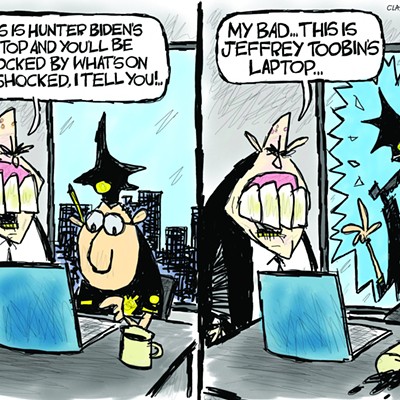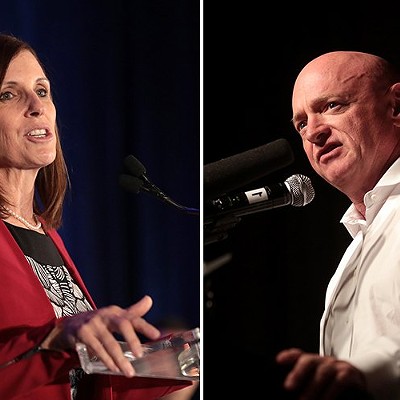That's why we're cutting to the chase with this simple list of nine things you ought to know about what the Arizona Legislature is up to this session. We've also provided a bonus list of a few bills worth following.
1. Republicans Are Firmly in Control
Republicans controlled the Legislature throughout Democrat Janet Napolitano's six years as governor, but she was skilled at outmaneuvering them in budget negotiations and frequently vetoed bills that, for example, allowed people to carry guns into bars or let pharmacists reject requests for birth-control pills. In a pinch, she could often count on moderate Republicans to break rank and work with Democrats to get budgets passed or block some of the more controversial legislation.But with Napolitano answering Obama's call to serve as director of homeland security, there's a new governor in town: Republican Jan Brewer, who doesn't share Napolitano's agenda (or her command of the numbers, for that matter).
That leaves Democrats all but powerless to do much besides offer up ignored alternatives and make an effort to slow down some of the bills. Meanwhile, Republicans are free to enact all of the spending cuts they want and pass a bunch of new laws that have been blocked over the last six years.
2. We're Broke!
The crashing economy has put the state's budget at center stage this year. Lawmakers started the session with two big-dollar problems: a gaping $1.6 billion hole in the current fiscal year that ends on June 30, and an estimated $3 billion spending gap in the budget year that begins on July 1. (Is it any wonder that Napolitano left town?)The first order of business was stopping the bleeding in the current fiscal year. The GOP lawmakers, led by Sen. Russell Pearce and Rep. John Kavanagh (who chair their respective chambers' budget committees), made a self-imposed Feb. 1 deadline, getting a budget to Brewer in time for her to sign it and still make it to Tampa Bay for the Super Bowl.
The budget fix slashed agency spending by $590 million, transferred $591 million from various accounts into the general fund and used $500 million from the incoming federal stimulus package. You've probably heard how all that is working out: The universities are shutting down museums, eliminating rural programs and laying off workers. Economic-development programs are evaporating. The state employees who get to keep their jobs are bracing for unpaid furloughs next year. State parks officials are trying to figure out whether they can keep the gates open.
Now Republicans are settling in to work on next year's budget. Senate President Bob Burns isn't allowing committees to hear any bills that aren't related to the budget as an incentive to keep his caucus focused on fixing the budget problems. Once that's done, he says, the Legislature will meet for a few more weeks to hear any other bills before adjourning for the year. Burns says he wants to keep senators from being distracted from the financial crisis--which, by the way, continues to get worse.
A report last week from the Joint Legislative Budget Committee notes that a preliminary look at January's revenue numbers suggest that tax collections were 21 percent lower than they were January 2008. The trend is not encouraging; if revenues continue to drop, the state could see another $250 million shortfall in the current fiscal year.
"We just don't seem to be able to hit a bottom," says Burns.
3. Priority One: Cut Taxes!
Although the state's budget problems mean cutbacks in education, health care, social services and every other area you'd care to name, there's still enough money in the budget for a tax cut.Specifically, Republicans have targeted the state's property tax, which has been earmarked for education. In 2006, the state had so much cash that lawmakers and Napolitano worked out a deal to suspend the tax for three years, with the idea that the tax would return when the state had less money to throw around.
But now that the state has less money to throw around, GOP lawmakers say that allowing the tax to return would harm the economy. The House GOP caucus announced last week that repealing the tax was a top priority; Senate President Bob Burns says the tax--which would cost the owner of a $200,000 home roughly $7 a month--would hurt recovery efforts.
"It's a dangerous thing to do," Burns says. "To bring back a $250 million tax on a struggling economy is counter-productive."
4. Women and Children First
As the economy collapses, more people are seeking state aid, which is putting more of a burden on the welfare system. At the same time, the Department of Economic Security is grappling with a cut of $103 million.We got our first peek at the impact of the budget cuts earlier this month, when the Department of Economic Security released a list of services that will be affected.
Child Protective Services employees will face unpaid days off, so they will be able to
investigate fewer reports of abuse. Single moms will find it more expensive to put their kids in day care so they can get to their low-wage jobs. Low-income senior citizens who are living on their own will lose state support. Homeless shelters will get less money. The list of those affected--disabled adults, grandparents caring for their grandkids, foster kids who turn 18 and are on their own--reads like the cast of a Dickens novel.
Dana Wolfe Naimark of the Children's Action Alliance last week called on lawmakers to "reduce the damage from this new budget" with federal stimulus dollars, accounting maneuvers and tax increases.
5. Here's a Little Learnin' for Ya!
Arizona's K-12 education programs took a $130 million cut that must be absorbed by June 30. School districts around the state are handling the cuts differently; the Tucson Unified School District, which will get $6.7 million less than expected, will use reserve funds, cut off travel for district employees, leave open positions vacant and put off making new purchases, according to Superintendent Elizabeth Celania-Fagen.Last week, GOP leaders offered their first options for cuts in next year's budget, totaling $800 million. That number will likely be whittled down, but TUSD is already bracing for a budget hit that ranges from $20 million to $80 million. Celania-Fagen says the district is now determining how to absorb those cuts, including a plan to let individual schools make decisions about how to trim spending.
Calvin Baker, superintendent of the Vail School District, sent a letter home to parents last week warning that the southeast-side district could be cut by as much as $8.6 million next year, after absorbing a cut of $1.1 million this year.
"We cannot continue to offer the same quality education with the kind of drastic cuts that have been proposed," Baker wrote. "We cannot expect our teachers to achieve the same results with more students, less support, less equipment, fewer supplies and reduced programs."
Baker points to studies that show Arizona to be one of the bottom three states when it comes to funding education. "There is no fat to be trimmed," he notes, especially when the cuts come on top of the loss of funds for school repairs and a freeze on money to build or even acquire land for new schools, which the growing district desperately needs.
But Burns says that studies showing Arizona at the bottom of the nation are "overhyped, if you will, and it's not accurate. ... To say that we are under-funding is in the eye of the beholder, but we have definitely increased funding in K-12 in the last decade, and when you get into this situation we're in now ... there have to be reductions through the whole system."
6. Screw U
The state's three universities are going to have to slash $141 million before the end of the fiscal year, despite a plea from the Board of Regents to limit the cuts to $100 million.Burns says that higher ed doesn't share the budget protections of K-12 education and some health-care programs, so "the universities are more exposed, if you will, when we get into downturn situations."
The UA's share of the cuts came out to roughly $57 million. The impact? Well, if you're planning to take the kids to the Flandrau Science Center, you'd better do it soon--the planetarium, which has been operating at the university for more than three decades, will be shutting its doors later this year. (Whether it ever re-opens as a downtown science center depends on what happens with the city's Rio Nuevo program; details below.)
You'll also find it harder to get into the Arizona State Museum, the UA Museum of Art and the Center for Creative Photography, all of which will be scaling back hours later this year.
UA President Robert Shelton has already warned employees that they'll be expected to take five days off without pay. Layoffs are also on the horizon.
How deep will next year's statewide university cuts be? Republican leaders were tossing around figures in the neighborhood of $300 million last week, although the final number is likely to be less severe.
7. Harmful If Swallowed
The UA's Arizona Poison and Drug Information Center, which operates a 24-hour hotline that helps parents and medical professionals deal with cases of accidental poisonings and venomous stings and bites, was on the chopping block earlier in the session, with lawmakers planning on transferring its duties to a similar operation in Maricopa County.But when Southern Arizona lawmakers objected, the GOP budget architects instead cut funding for both facilities. Lawmakers are now considering having the two centers compete for funding in the budget year that begins July 1.
8. Rio Nuevo Is in Big Trouble
Back in the late '90s, the Legislature gave Tucson the chance to retain about $120 million in state sales taxes over 10 years to invest in an effort to revitalize downtown Tucson. But it wasn't until the 2006 session that downtown boosters managed to persuade lawmakers to extend the district for 12 more years, giving Tucson somewhere around $500 million over the lifetime of the project.But the slow pace of downtown redevelopment has some lawmakers impatient with Tucson and threatening to take away the funding. Last week, Republicans grilled Rio Nuevo boss Greg Shelko, who did little to persuade them that they shouldn't strip the funding from the city.
Rio Nuevo's fate will be decided when lawmakers draw up next year's state budget.
9. So Much for Science and High Tech
Lawmakers drained $22.5 million from the 21st Century Fund, which provided grants to Science Foundation Arizona, which in turn used the money to lure matching funds for medical and scientific research efforts in Arizona, such as the Critical Path Institute here in Southern Arizona, which is working on ways to bring new prescription drugs to the market.Republican leaders planned to leave some money in the fund to honor existing contracts, but Rep. Sam Crump and a group of freshmen GOP House members--including Frank Antenori, David Gowan and David Stevens of Southern Arizona--insisted they wouldn't vote for a budget that included any funding for the program, which they dismissed as corporate pork.
Burns said last week that some of the funding might be restored, because Science Foundation Arizona had already signed contracts to provide the dollars.
Bills of Note
While the budget is still job No. 1, lawmakers have introduced more than 1,000 bills. Here's a list of notable ones:• SB 1113 would repeal the prohibition against taking guns into restaurants that serve alcohol, unless restaurant owners post a sign banning firearms.
• SB 1270 would repeal the state's restrictions against carrying a concealed weapon, except in the commission of a crime.
• HB 2474 would prohibit employers from banning workers from keeping guns in their cars while on company property.
• HB 2607 would allow anyone with a concealed-weapons permit to carry a gun on school campuses.
• HB 2106 would ban the use of photo-radar systems to bust speeders on Arizona highways.
• HB 2564 is an omnibus abortion bill. Sponsored by Rep. Nancy Barto (R-Phoenix), it contains a number of restrictions that have been previously vetoed by Napolitano. The bill spells out specific requirements a judge must consider when allowing a minor to seek an abortion without parental permission; creates a 24-hour waiting period before a woman can have an abortion after she meets with her doctor; specifies detailed information that a doctor must tell a woman before she has an abortion; and allows pharmacists to refuse to fill prescriptions for emergency contraception or other abortion medication.
• HB 2249 would prohibit cities and towns from holding partisan elections. Since the city of Tucson is the only major city that still identifies the party affiliation of its council candidates, it's clearly aimed at shaking up the system here. It would also end Tucson's system of electing council candidates citywide. Instead, only members of their wards would be eligible to vote for them.
• SB 1174 would strip health benefits from domestic partners of state employees.
• SB 1177 makes it illegal to give a ride to someone who is in the country illegally. Violators are subject to a $1,000 fine and can have their vehicles impounded.
• HB 2258 makes it legal for kids to play with sparklers.
• SCR 1025 would ask voters to ban the use of any public money on campaigns for state office, effectively ending the state's Clean Elections program.
• SCR 1026 would ask voters to approve an amendment to the Arizona Constitution requiring that workers use a secret ballot when voting whether to form a union.
• HCR 2024 is a postcard to Congress complaining that the federal government has overstretched its authority, demanding that it "cease and desist, effective immediately, mandates that are beyond the scope" of the Constitution. It also demands any laws that direct the states to do anything in exchange for federal funding be repealed.
• SB 1158 would require that candidates for the presidency of the United States file paperwork with the state proving that they are natural-born citizens.
• SCR 1041 would tackle the state's budget crisis by asking voters to eliminate the state income tax and give the Legislature the option of replacing it with a higher sales tax, if lawmakers think it is necessary.















